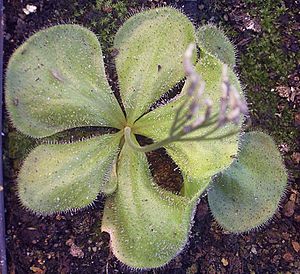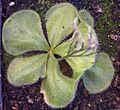Red ink sundew facts for kids
Quick facts for kids Red ink sundew |
|
|---|---|
 |
|
| Scientific classification |
|
| Kingdom: | Plantae |
| Clade: | Tracheophytes |
| Clade: | Angiosperms |
| Clade: | Eudicots |
| Order: | Caryophyllales |
| Family: | Droseraceae |
| Genus: | Drosera |
| Subgenus: | Drosera subg. Ergaleium |
| Section: | Drosera sect. Erythrorhiza |
| Species: |
D. erythrorhiza
|
| Binomial name | |
| Drosera erythrorhiza |
|
| Subspecies | |
|
|
| Script error: The function "autoWithCaption" does not exist. | |
| Synonyms | |
|
|
Script error: No such module "Check for conflicting parameters".
The Drosera erythrorhiza, also known as the red ink sundew, is a special type of carnivorous plant. It's a perennial plant, meaning it lives for more than two years. This plant grows from a tuber (a swollen underground stem, like a potato).
You can find the red ink sundew only in Western Australia. It grows in a flat, circular shape called a rosette. What makes it stand out are its many flowers. It can have up to 50 flowers on one stem!
Contents
Discovering the Red Ink Sundew
The red ink sundew was first officially described in 1839. A botanist named John Lindley wrote about it in his book, A sketch of the vegetation of the Swan River Colony.
Different Types of Red Ink Sundews
Plants of the same species can sometimes have slight differences. These are called subspecies. In 1992, two scientists, N. G. Marchant and Allen Lowrie, identified three new subspecies of Drosera erythrorhiza. They looked at the shape of the leaves and where the plants grew to tell them apart.
- D. erythrorhiza subsp. collina is named for its home in hilly areas. It often has many leaves of different shapes in its rosette.
- D. erythrorhiza subsp. erythrorhiza has fewer and wider leaves.
- D. erythrorhiza subsp. magna has even larger and wider leaves. It also tends to have more leaves than the erythrorhiza subspecies.
- D. erythrorhiza subsp. squamosa was first thought to be a separate species in 1864. However, Marchant and Lowrie later decided it was a subspecies of D. erythrorhiza. This subspecies has red edges on its leaves. These red edges come from many tiny red tentacles.
How Scientists Classify Plants
Sometimes, scientists have different ideas about how to group plants. In 1999, two researchers, Jindřich Chrtek and Zdeňka Slavíková, suggested a new way to classify these tuberous sundews.
They wanted to put them into an older genus called Sondera. This would mean that the subspecies of Drosera erythrorhiza would become separate species under Sondera. For example, D. erythrorhiza subsp. collina would become Sondera collina. However, most scientists today still follow the original classification under Drosera.
Images for kids
See also
 In Spanish: Drosera erythrorhiza para niños
In Spanish: Drosera erythrorhiza para niños
 | Stephanie Wilson |
 | Charles Bolden |
 | Ronald McNair |
 | Frederick D. Gregory |


